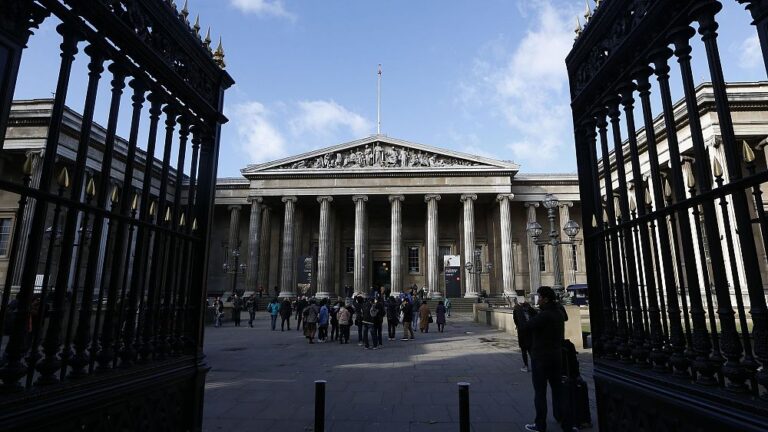Questions are being raised about the British Museum’s security protocols, its handling of thefts and how long senior management was aware before taking action. Today, Greece renews its calls for the return of the Parthenon marbles.
The British Museum is dealing with the fallout from the theft and sale of objects, following news that as many as 2,000 precious objects have been stolen and sold online, or otherwise damaged.
In the context of the scandal, Greek officials are renewing their calls for the return of the Parthenon marbles.
The security questions raised by the missing objects “reinforce our country’s permanent and just demand for the definitive return” of the Marbles, Greek Culture Minister Lina Mendoni said in a recent interview with the newspaper To Vima.
“The loss, theft, deterioration of objects from a museum’s collections is an extremely serious and particularly sad event,” Mendoni said. “In fact, when this happens from within, beyond any moral and criminal responsibility, a major question arises about the credibility of the museum organization itself. »
She further explained that “the Ministry of Culture is following the development of the issue with great attention.”
In response, the chair of the British Museum’s all-party parliamentary group accused Greece of “blatant opportunism” by saying the institution was “unsafe” following the thefts from the museum.
Tim Loughton told BBC Radio 4’s Today program that news of objects disappearing from the London museum’s collection is “damaging” but that the institution takes such thefts “seriously”.
The Conservative MP added: “To reassure themselves, people want to know the extent of the items that have gone missing, what investigations were carried out at the time the various reports came in and what is being done now because otherwise (it) becomes uncontrollable. »
“What is particularly damaging is the blatant opportunism of the Greeks and others who say ‘Oh no, the British Museum is not safe…’ It is incredibly rare for objects to disappear.”
Loughton also said the disappearance of objects was serious but “it’s not the theft of the Mona Lisa.”
Despina Koutsoumba, president of the Association of Greek Archaeologists, also said her colleagues were “worried” about the number of missing Greek objects.
She told the BBC: “We want to tell the British Museum that they can no longer say that Greek cultural heritage is better protected at the British Museum. It is obvious that it is very well protected in Greece and not in the British Museum.
Last week, the British Museum announced it had fired an employee after discovering valuable items from its collection were missing. The institution announced its intention to take “legal action” against Peter John Higgs, a senior curator of Greek and Roman art who had worked at the museum for 30 years. Higgs is suspected of stealing the items for several years.
Many items were put up for sale on eBay.
The Daily Telegraph reported that the number of items stolen was believed to be “well over 1,000” and “closer to 2,000”, with a value of “millions of pounds”.
The museum vigorously denied allegations of a cover-up after it was reported that officials were warned two years ago that items were being removed from the collection and sold.
The British Museum, which has owned the Parthenon sculptures – also known as the Elgin Marbles – since they were removed from the Acropolis in Athens in the early 19th century by Lord Elgin, has repeatedly rejected the requests for repatriation of relics from Greece.
Nonetheless, the Greek campaign has gained momentum amid international calls for cultural institutions to decolonize their holdings. In March, the Vatican returned three fragments of the Parthenon temple that it had preserved for centuries.
In March this year, Sir Noel Malcolm, a fellow of All Souls College, Oxford, said that “the Elgin Marbles are the jewels in the crown of the British Museum, a national museum with a universal mission. We should be proud of our ability to show them to the world in London. There is no reason to apologize here.
Additional sources • In Vima, the Daily Telegraph


